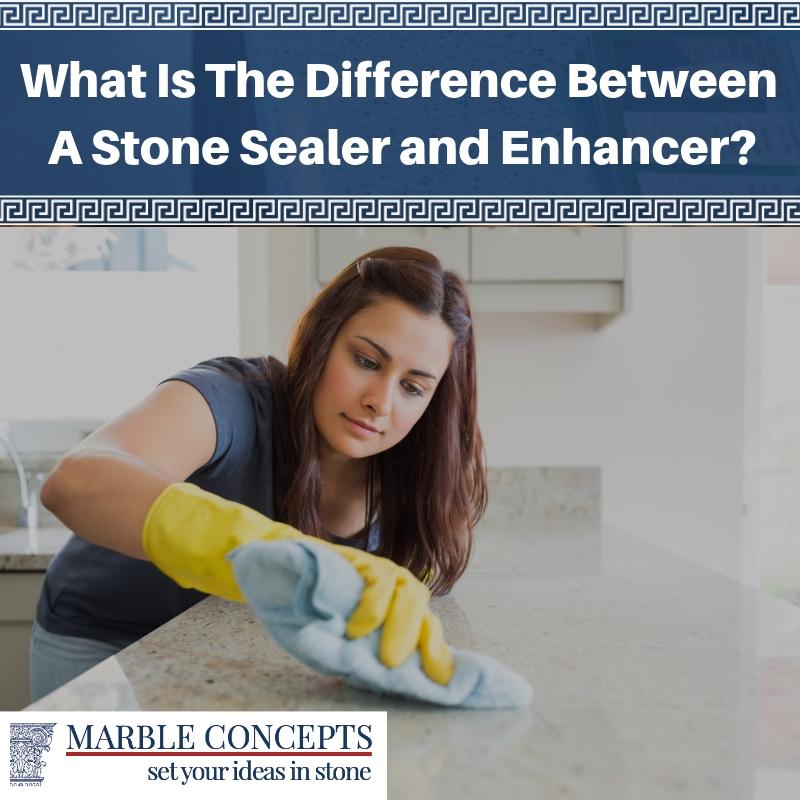There are several ways to care for and bring out the beauty of natural stone and it can be accomplished with both a stone sealer or a stone enhancer. Knowing the difference between the two is important. Here is a breakdown of the two and the distinctions between them.
Stone Sealers
A stone sealer creates a barrier on the stone that is resistant to stains. A sealer is protective in nature, but it will not change the appearance or the feel of the stone. There are different types of sealers that include:
– Topical or Surface Sealers
Topical sealers are products that are applied to the top surface of stone. They give the stone a lustrous finish. An even higher gloss can be achieved, particularly if the stone is buffed. This type of sealer provides protection from scratches, etching, dull spots, white rings, and other marks. It is not as effective with smooth surfaces, such as stonework with matte or honed (flat and smooth) surface areas, and it may require repeat applications, which involves stripping off the old layer and applying another one. Topical sealers can create a barrier that blocks the transference of water vapor, which could put a stone surface in jeopardy. Cracks could appear where vapor has tried to escape. This type of sealer is not always recommended for countertop use but is more often used to seal flooring that is made of natural stone.
– Impregnating sealers
An impregnating sealer contains resins that are transported by water or solvents that penetrate the stone’s surface. A solvent-based impregnator is able to penetrate stone at a greater depth, but a residual odor can linger, which can be annoying in a kitchen or other living spaces. If this kind of impregnator is used, it is probably best to be away from the area. Impregnators that are water-based will not penetrate stone as deeply as a solvent but anything spilled that is liquid based will not permeate as deeply.
Once either the water or solvents have dissipated, the resins that remain are what provide a protective seal and barrier from liquid stains. An impregnating sealer won’t provide complete protection, but it will allow for enough time to wipe up a spill before a stain progresses and does its damage. The actual surface of the stone is not completely protected from scratches or problems with etching, as any kind of acidic liquid, including vinegar, can be just as damaging to a sealed or unsealed countertop.
– Hydrophobic or Oleophobic Impregnators
One thing to watch for with impregnators is whether they are labeled hydrophobic (water based product) or oleophobic (solvent based product). A hydrophobic sealer will only protect against water-based types of liquids; whereas, an oleophobic sealer will be protective against both water and oil-based products. An oleophobic sealer is probably preferable for use as it can deal with both liquids and oil spills that may happen in a food preparation area or kitchen. Both of these impregnators will hinder water absorption, yet they are still capable of allowing water vapor or moisture to escape in order to avoid cracks.
Stone Enhancers
A stone enhancer is designed to intensify, highlight or deepen the natural color of stone, and a number of enhancers offer the popular “wet” look that so many homeowners like to envision on their stone countertops and floors. Enhancers are also designed to bring various levels of shine to the surface of stonework. Most stone enhancers don’t provide a barrier of protection against stains, though there are some product lines that incorporate both a sealer and enhancer in one product. Enhancers are most often used with stone that has an unpolished surface finish. An enhancing sealer is pretty much permanent so attempting to return the stone surface to its original appearance is extremely difficult, if not impossible.
Necessary or Not so Necessary
A stone enhancer isn’t entirely necessary, but a stone sealer is something that shouldn’t be overlooked. It is important to seal countertop and floor surfaces to protect them from stains, wear and direct sunlight. Areas and spaces that are not as well traveled or used should also be sealed to protect them and preserve them for the future. The value of a home is certainly increased with the maintenance and upkeep of stone countertops and flooring.
Whether you choose to go the route of a stone sealer or enhancer, there are certainly going to be questions concerning the process. If you have those questions and want answers concerning either process, complete the online contact form and an expert will get back to you with the answers you need.






